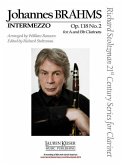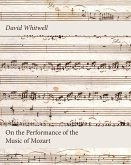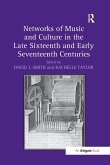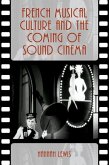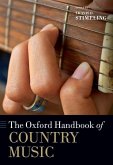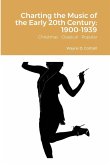Early Music in the 21st Century
Herausgeber: Mitchell, Mimi
Schade – dieser Artikel ist leider ausverkauft. Sobald wir wissen, ob und wann der Artikel wieder verfügbar ist, informieren wir Sie an dieser Stelle.
Early Music in the 21st Century
Herausgeber: Mitchell, Mimi
- Broschiertes Buch
- Merkliste
- Auf die Merkliste
- Bewerten Bewerten
- Teilen
- Produkt teilen
- Produkterinnerung
- Produkterinnerung
This collection about the early music movement will appeal to performers, teachers, academics, instrument makers, amateur musicians, and music lovers. With chapters about new ways to study, teach, perform, and listen to early music, there is something to appeal to everyone. The diverse group of authors--from young to established voices who live across the globe--offer positive, diverse, exciting, and challenging points of view about how the early music movement can go forward into the future.
Andere Kunden interessierten sich auch für
![2 Sonatines for Clarinet, Op. Post. 137: Richard Stoltzman 21st Century Series for Clarinet Clarinet and P [With CD (Audio)] 2 Sonatines for Clarinet, Op. Post. 137: Richard Stoltzman 21st Century Series for Clarinet Clarinet and P [With CD (Audio)]]() 2 Sonatines for Clarinet, Op. Post. 137: Richard Stoltzman 21st Century Series for Clarinet Clarinet and P [With CD (Audio)]21,99 €
2 Sonatines for Clarinet, Op. Post. 137: Richard Stoltzman 21st Century Series for Clarinet Clarinet and P [With CD (Audio)]21,99 €![Intermezzo, Op. 118, No. 2: Clarinet in a or B-Flat and Piano Richard Stoltzman 21st Century Series for Clarinet Intermezzo, Op. 118, No. 2: Clarinet in a or B-Flat and Piano Richard Stoltzman 21st Century Series for Clarinet]() Intermezzo, Op. 118, No. 2: Clarinet in a or B-Flat and Piano Richard Stoltzman 21st Century Series for Clarinet19,99 €
Intermezzo, Op. 118, No. 2: Clarinet in a or B-Flat and Piano Richard Stoltzman 21st Century Series for Clarinet19,99 €![On the Performance of the Music of Mozart On the Performance of the Music of Mozart]() David WhitwellOn the Performance of the Music of Mozart27,99 €
David WhitwellOn the Performance of the Music of Mozart27,99 €![Networks of Music and Culture in the Late Sixteenth and Early Seventeenth Centuries Networks of Music and Culture in the Late Sixteenth and Early Seventeenth Centuries]() David J SmithNetworks of Music and Culture in the Late Sixteenth and Early Seventeenth Centuries71,99 €
David J SmithNetworks of Music and Culture in the Late Sixteenth and Early Seventeenth Centuries71,99 €![French Musical Culture and the Coming of Sound Cinema French Musical Culture and the Coming of Sound Cinema]() Hannah LewisFrench Musical Culture and the Coming of Sound Cinema48,99 €
Hannah LewisFrench Musical Culture and the Coming of Sound Cinema48,99 €![The Oxford Handbook of Country Music The Oxford Handbook of Country Music]() The Oxford Handbook of Country Music59,99 €
The Oxford Handbook of Country Music59,99 €![Charting the Music of the Early 20th Century Charting the Music of the Early 20th Century]() Wayne CottrellCharting the Music of the Early 20th Century67,99 €
Wayne CottrellCharting the Music of the Early 20th Century67,99 €-
-
-
This collection about the early music movement will appeal to performers, teachers, academics, instrument makers, amateur musicians, and music lovers. With chapters about new ways to study, teach, perform, and listen to early music, there is something to appeal to everyone. The diverse group of authors--from young to established voices who live across the globe--offer positive, diverse, exciting, and challenging points of view about how the early music movement can go forward into the future.
Produktdetails
- Produktdetails
- Verlag: Oxford University Press
- Erscheinungstermin: 13. Januar 2025
- Englisch
- Abmessung: 232mm x 154mm x 15mm
- Gewicht: 582g
- ISBN-13: 9780197683071
- ISBN-10: 019768307X
- Artikelnr.: 71162043
- Herstellerkennzeichnung
- Libri GmbH
- Europaallee 1
- 36244 Bad Hersfeld
- gpsr@libri.de
- Verlag: Oxford University Press
- Erscheinungstermin: 13. Januar 2025
- Englisch
- Abmessung: 232mm x 154mm x 15mm
- Gewicht: 582g
- ISBN-13: 9780197683071
- ISBN-10: 019768307X
- Artikelnr.: 71162043
- Herstellerkennzeichnung
- Libri GmbH
- Europaallee 1
- 36244 Bad Hersfeld
- gpsr@libri.de
Mimi Mitchell enjoys a dual career as a musicologist and a historical violinist. She was co-curator of the symposium The Historical Violin (STIMU, Utrecht Early Music Festival, 2019) and curated the conference Early Music in the 21st Century (Conservatorium van Amsterdam, 2021). She contributed a chapter to the Kunsthistorisches Museum Vienna's The Collection of Historic Musical Instruments: The First 100 Years (2018) and presented a series of lectures and articles for the "Revival" Utrecht Early Music Festival (2023). She is a Masters Research Coordinator and Senior Lecturer at the Conservatorium van Amsterdam and works internationally as a speaker, teacher, violinist/conductor, and coach.
* Foreword: Polarization, Reintegration, and Diversity
* Sir Nicholas Kenyon
*
* 1. Introduction
* Mimi Mitchell
* Part I: Methodological Viewpoints
* 2. Early Music: Views from Ethnomusicology
* Caroline Bithell
* 3. Renewing Historical Performance through an Embodiment of
Historical Acting Techniques
* Jed Wentz
* 4. Historical Interpretation Research-New Sources and Methodologies
* Kai Köpp
* Part II: (Non) Historical Instruments
* 5. Making (Faking?) Early Music
* Jeremy Montagu
* 6. Plastic Fantastic?
* Fiona Brock, Andrew Hughes, and Jeremy Uden
* 7. Modern Versus Historical Instruments: International Bach
Competition Leipzig
* Mimi Mitchell
* Part III: Pedagogical Perspectives
* 8. Professionalizing Historical Performance: The Past and Present of
Early Music Education in Am-sterdam
* Kailan Rubinoff
* 9. "HIP for All" or Specialized Training: Diverse Missions for Early
Music in Higher Education
* Kelly Landerkin and Claire Michon
* 10. Nows, Thens, and Truths: Attending to the Present in Performing
the Past
* Jonathan Impett
* 11. Towards a More Inclusive Early Music
* Deanna Pellerano
* Part IV: Transformative Technologies
* 12. Early Music and the Paradox of Technology
* Alon Schab
* 13. "Nutrition in an Age of Diet Soft Drinks": the Utopa Baroque
Organ in Amsterdam
* Hans Fidom
* 14. Developing Virtual Acoustic Systems for Use in Early Music
Research
* Eoin Callery and Jonathan Abel
* Part V: Revisiting History
* 15. The New Dutch Recorder Sound of the 1960s
* Robert Ehrlich
* 16. Early Music in the Latin Americas: An Alternative Scene
* Melodie Michel
* 17. Remixes and Radical Revivals: Baroque Opera Production and the
Opera Wars
* Caitlin Vincent
* Index
* Sir Nicholas Kenyon
*
* 1. Introduction
* Mimi Mitchell
* Part I: Methodological Viewpoints
* 2. Early Music: Views from Ethnomusicology
* Caroline Bithell
* 3. Renewing Historical Performance through an Embodiment of
Historical Acting Techniques
* Jed Wentz
* 4. Historical Interpretation Research-New Sources and Methodologies
* Kai Köpp
* Part II: (Non) Historical Instruments
* 5. Making (Faking?) Early Music
* Jeremy Montagu
* 6. Plastic Fantastic?
* Fiona Brock, Andrew Hughes, and Jeremy Uden
* 7. Modern Versus Historical Instruments: International Bach
Competition Leipzig
* Mimi Mitchell
* Part III: Pedagogical Perspectives
* 8. Professionalizing Historical Performance: The Past and Present of
Early Music Education in Am-sterdam
* Kailan Rubinoff
* 9. "HIP for All" or Specialized Training: Diverse Missions for Early
Music in Higher Education
* Kelly Landerkin and Claire Michon
* 10. Nows, Thens, and Truths: Attending to the Present in Performing
the Past
* Jonathan Impett
* 11. Towards a More Inclusive Early Music
* Deanna Pellerano
* Part IV: Transformative Technologies
* 12. Early Music and the Paradox of Technology
* Alon Schab
* 13. "Nutrition in an Age of Diet Soft Drinks": the Utopa Baroque
Organ in Amsterdam
* Hans Fidom
* 14. Developing Virtual Acoustic Systems for Use in Early Music
Research
* Eoin Callery and Jonathan Abel
* Part V: Revisiting History
* 15. The New Dutch Recorder Sound of the 1960s
* Robert Ehrlich
* 16. Early Music in the Latin Americas: An Alternative Scene
* Melodie Michel
* 17. Remixes and Radical Revivals: Baroque Opera Production and the
Opera Wars
* Caitlin Vincent
* Index
* Foreword: Polarization, Reintegration, and Diversity
* Sir Nicholas Kenyon
*
* 1. Introduction
* Mimi Mitchell
* Part I: Methodological Viewpoints
* 2. Early Music: Views from Ethnomusicology
* Caroline Bithell
* 3. Renewing Historical Performance through an Embodiment of
Historical Acting Techniques
* Jed Wentz
* 4. Historical Interpretation Research-New Sources and Methodologies
* Kai Köpp
* Part II: (Non) Historical Instruments
* 5. Making (Faking?) Early Music
* Jeremy Montagu
* 6. Plastic Fantastic?
* Fiona Brock, Andrew Hughes, and Jeremy Uden
* 7. Modern Versus Historical Instruments: International Bach
Competition Leipzig
* Mimi Mitchell
* Part III: Pedagogical Perspectives
* 8. Professionalizing Historical Performance: The Past and Present of
Early Music Education in Am-sterdam
* Kailan Rubinoff
* 9. "HIP for All" or Specialized Training: Diverse Missions for Early
Music in Higher Education
* Kelly Landerkin and Claire Michon
* 10. Nows, Thens, and Truths: Attending to the Present in Performing
the Past
* Jonathan Impett
* 11. Towards a More Inclusive Early Music
* Deanna Pellerano
* Part IV: Transformative Technologies
* 12. Early Music and the Paradox of Technology
* Alon Schab
* 13. "Nutrition in an Age of Diet Soft Drinks": the Utopa Baroque
Organ in Amsterdam
* Hans Fidom
* 14. Developing Virtual Acoustic Systems for Use in Early Music
Research
* Eoin Callery and Jonathan Abel
* Part V: Revisiting History
* 15. The New Dutch Recorder Sound of the 1960s
* Robert Ehrlich
* 16. Early Music in the Latin Americas: An Alternative Scene
* Melodie Michel
* 17. Remixes and Radical Revivals: Baroque Opera Production and the
Opera Wars
* Caitlin Vincent
* Index
* Sir Nicholas Kenyon
*
* 1. Introduction
* Mimi Mitchell
* Part I: Methodological Viewpoints
* 2. Early Music: Views from Ethnomusicology
* Caroline Bithell
* 3. Renewing Historical Performance through an Embodiment of
Historical Acting Techniques
* Jed Wentz
* 4. Historical Interpretation Research-New Sources and Methodologies
* Kai Köpp
* Part II: (Non) Historical Instruments
* 5. Making (Faking?) Early Music
* Jeremy Montagu
* 6. Plastic Fantastic?
* Fiona Brock, Andrew Hughes, and Jeremy Uden
* 7. Modern Versus Historical Instruments: International Bach
Competition Leipzig
* Mimi Mitchell
* Part III: Pedagogical Perspectives
* 8. Professionalizing Historical Performance: The Past and Present of
Early Music Education in Am-sterdam
* Kailan Rubinoff
* 9. "HIP for All" or Specialized Training: Diverse Missions for Early
Music in Higher Education
* Kelly Landerkin and Claire Michon
* 10. Nows, Thens, and Truths: Attending to the Present in Performing
the Past
* Jonathan Impett
* 11. Towards a More Inclusive Early Music
* Deanna Pellerano
* Part IV: Transformative Technologies
* 12. Early Music and the Paradox of Technology
* Alon Schab
* 13. "Nutrition in an Age of Diet Soft Drinks": the Utopa Baroque
Organ in Amsterdam
* Hans Fidom
* 14. Developing Virtual Acoustic Systems for Use in Early Music
Research
* Eoin Callery and Jonathan Abel
* Part V: Revisiting History
* 15. The New Dutch Recorder Sound of the 1960s
* Robert Ehrlich
* 16. Early Music in the Latin Americas: An Alternative Scene
* Melodie Michel
* 17. Remixes and Radical Revivals: Baroque Opera Production and the
Opera Wars
* Caitlin Vincent
* Index

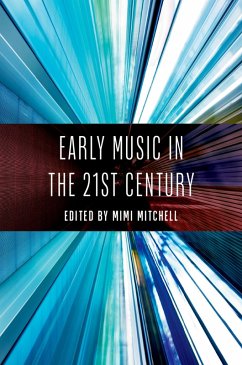
![2 Sonatines for Clarinet, Op. Post. 137: Richard Stoltzman 21st Century Series for Clarinet Clarinet and P [With CD (Audio)] 2 Sonatines for Clarinet, Op. Post. 137: Richard Stoltzman 21st Century Series for Clarinet Clarinet and P [With CD (Audio)]](https://bilder.buecher.de/produkte/63/63973/63973496m.jpg)
